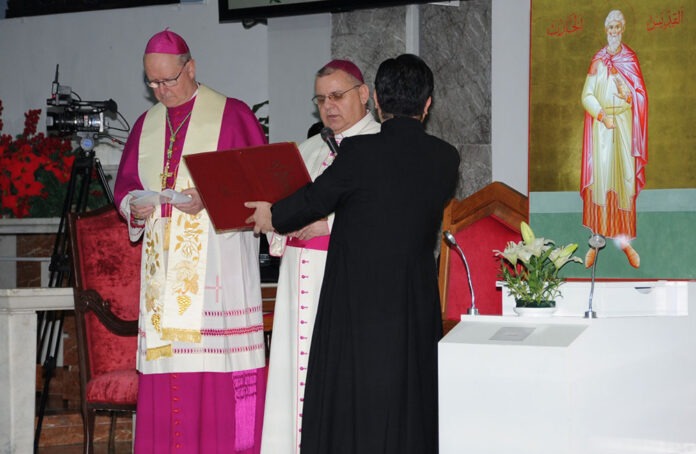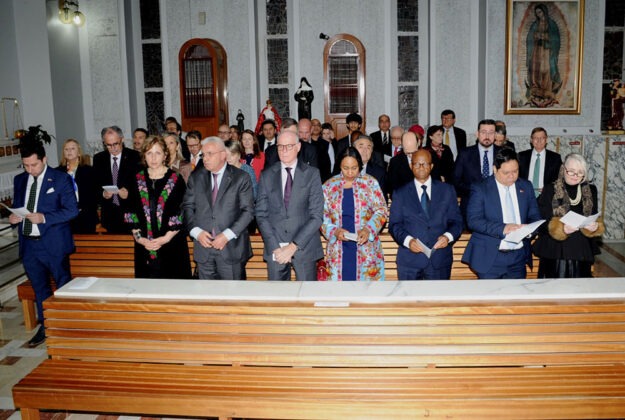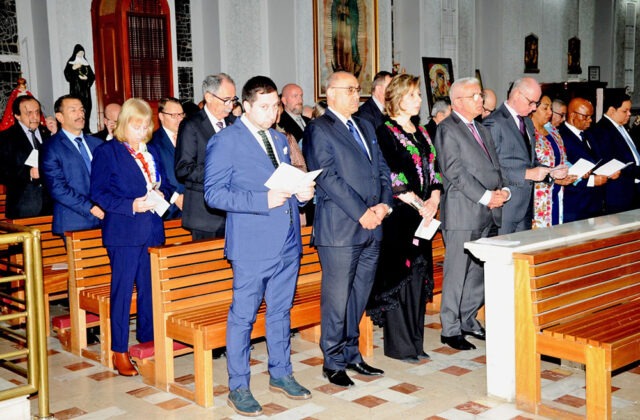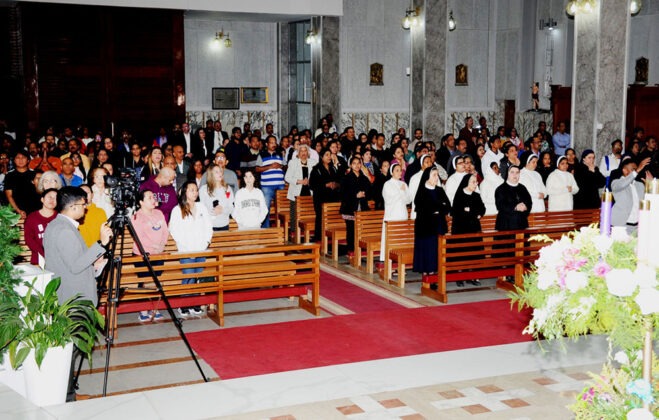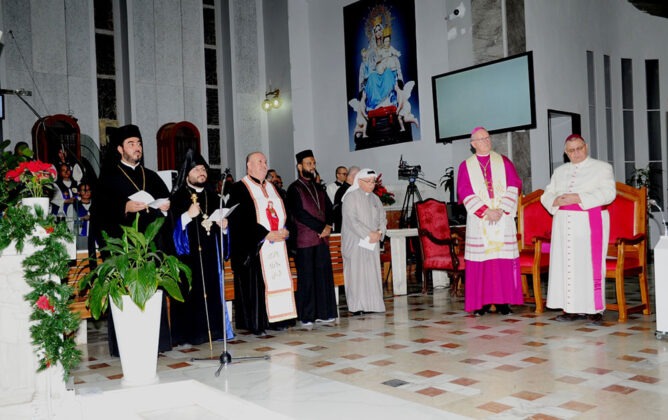By Reaven D’Souza
Executive Managing Editor
A Prayer for Peace in the Holy Lands was held on 07 December by the Apostolic Nuncio in Kuwait, Bahrain and Qatar, His Grace Archbishop Eugene Martin Nugent, and the Apostolic Vicar of Northern Arabia His Excellency Bishop Aldo Berardi in the Holy Family Co-Cathedral in Kuwait City. The specially held ecumenical prayer service saw the various heads of the Christian churches in the country come together and pray for peace, urging good sense to prevail in the Holy Lands.
Several diplomats also attended the service and joined the church in praying for peace, and also for the wellbeing of the people of Gaza. People from all faiths attended the prayer service and took part in the ceremonies in praying for peace in the region. Archbishop Nugent spoke eloquently on the ongoing barbaric acts of violence being perpetrated on the population and the loss of innocent civilian lives, including that of women and children. He called for the mindless destruction of human life and property to stop.
 “War is ravaging the Holy Lands with untold pain and suffering. We have all been affected by the killings in Israel on October 7th and the subsequent kidnappings which traumatized Israelis. While not all who were killed or kidnapped were Israelis, the Hamas attack has shaken Israel as it is considered to be the biggest single loss of life in one day since the Shoah,” Archbishop Nugent stated.
“War is ravaging the Holy Lands with untold pain and suffering. We have all been affected by the killings in Israel on October 7th and the subsequent kidnappings which traumatized Israelis. While not all who were killed or kidnapped were Israelis, the Hamas attack has shaken Israel as it is considered to be the biggest single loss of life in one day since the Shoah,” Archbishop Nugent stated.
He pointed out that the Hamas attack on Israel was followed about two weeks later by the Israeli counter-attack on Gaza that has unleashed a humanitarian disaster of epic proportions. Over 17,000 Palestinians have been killed to date; 65 percent of whom are women and children. The images that we have been seeing on our TV screens of what is happening in Gaza are unbearable. The deaths of innocent children, women and the elderly are truly shocking.
He added that the population of two million people in Gaza have been deprived of fuel, water, food and medicine for almost two months now. A mass displacement of 1.8 million people with nowhere to find refuge. Hospitals, houses, schools, churches, and mosques have been destroyed.
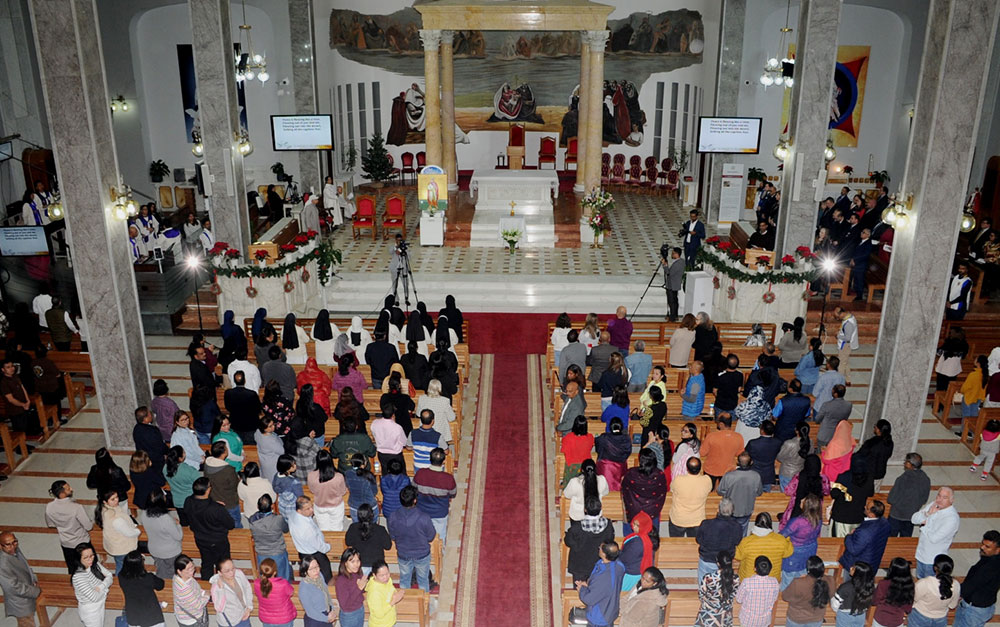 “Since the war started, we have heard numerous political statements from both sides and from the international community and apart from a truce that lasted a week, the war continues with huge loss of life. We are not here this evening to add to this list of statements or to condemn one side or the other. That is not what this pulpit is for. Rather, we are here, first and foremost as people of religion to gather in prayer. We are here as representatives of the Christian Churches in Kuwait, as people of faith who seek to join our hands in prayer, beseeching the Lord to restore peace to the beloved Holy Land,” said the archbishop.
“Since the war started, we have heard numerous political statements from both sides and from the international community and apart from a truce that lasted a week, the war continues with huge loss of life. We are not here this evening to add to this list of statements or to condemn one side or the other. That is not what this pulpit is for. Rather, we are here, first and foremost as people of religion to gather in prayer. We are here as representatives of the Christian Churches in Kuwait, as people of faith who seek to join our hands in prayer, beseeching the Lord to restore peace to the beloved Holy Land,” said the archbishop.
He went on to stress, “Our faith tells us that where there is death and despair, the Almighty can bring peace and hope, where there is darkness, he can bring light. This is why we are here. As Christians we believe in the power of prayer. We believe in the power of prayer to turn the hearts of leaders away from the logic of war and so-called military solutions, to the ways of dialogue, reconciliation, and peace. For God everything is possible. Nothing is impossible to God. Even though the situation is dire, we must hope that peace is possible. We must ‘hope against hope’ as Saint Paul says.”
The archbishop added, “I think it is true to say that every person seeks peace. I think it is equally true to say that the vast majority of people reject terrorism from whatever side it springs. But true peace and security can never be based on fear, violence, and injustice. Conflicts disfigure the bonds between peoples and between States, with civilians always bearing the brunt of the suffering. How many children are forced to take part, directly or indirectly, in fighting, and bear the scars? As Pope Francis has said, ‘No war is worth the tears of children’.”
“At this moment there is immense suffering in the Holy Lands There is immense pain. We feel that pain. We cannot ignore it. We feel it in the depths of our being. From these depths we raise up our voices in prayer together with Muslims and Jews; with men and women of goodwill the world over who earnestly seek an end to this conflict that has caused so much bloodshed down the years,” said the archbishop fervently.
He continued, “This evening we are reflecting and praying for peace in the Holy Lands, even as we remember Ukraine and the other parts of the world where wars are raging. We are praying for peace through the lens of the Beatitudes which we have just read. The Beatitudes, as you know, are the basic charter of the teaching of Jesus. In reflecting on this teaching, we find guidance in our prayer for peace.
“The beatitudes highlight the call for reconciliation and dialogue; difficult and challenging as this may seem amid the din of war. As leaders of the Christian Churches, we urge all individuals not to despair or be resigned to war, but to actively work towards peace. The Church teaches us that, while one cannot ignore the historical and deep-rooted tensions of this conflict, one should look beyond them for the good of future generations, by embracing our common humanity, extending the hand of friendship, putting aside animosity, and pursuing the path of righteousness. I am convinced that, with goodwill on all sides, Israel and Palestine can pave the way for a more peaceful coexistence in the Holy Lands.”
In conclusion, Archbishop Nugent said, “Let us pray for the Palestinian people; let us pray for the Israeli people. Pray for wisdom, for justice, for reconciliation, for hope so that peace may come to the Holy Lands. Let each one of us remain in silent prayer for two minutes — each one praying for peace in the Land of Our Lord and in our very troubled world.”

